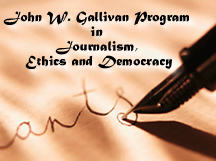
For as long as she can remember, senior Katie Stuhldreher has wanted to be a foreign correspondent. With internship training inPrague,Sarajevo, and most recently at the Moscow News, her real-world experiences in journalism have reinforced her aspirations.
A political science and Russian double major, Katie also is enrolled in Notre Dames Gallivan Program in Journalism, Ethics and Democracy, a minor for students interested in careers in print and broadcast journalism. Unlike many journalism programs, the Gallivan Program subordinates technical training and emphasizes ethical and social dimensions of journalistic instruction, demanding a traditional major while fulfilling the requirements of the journalism minor.This distinctive approach provides students with a rare and valuable perspective in a journalism world often shaken by blurred lines and fuzzy facts.
I did an internship at the Moscow News, which was founded during the Soviet period as a propaganda paper,Stuhldreher said.The paper now is in transition to a free press system,and is struggling to decide its political leaning.In my time there, I worked to try and help the editorial staff rewrite its standards and develop a sense of ethics.The editors asked me to work as a consultant on these matters.In having to explain the importance of ethics in a newsroom to people in a system still lacking a full understanding of journalistic ethics and responsibilities, I better understood myself why the Gallivan Programs focus on ethics is so well-placed.
Notre Dames journalism program took shape 10 years ago with the first meeting of an advisory committee of Notre Dame graduates in journalism – whose current members include Anne Thompson, chief financial correspondent for NBC News; Tom Bettag, executive producer for The Koppel Group, Discovery Networks; and Bill Dwyre, former sports editor and now a columnist for the Los Angeles Times.
What journalism desperately needs these days are people who have a vision for the role of media in American society, people who have the backbone to stand up to the political and economic pressures that are a daily fact of life,said Bettag.Notre Dames long tradition of commitment to social justice and ethical standards makes this a program that can train leaders in a field that needs bold leadership.
The advisory committee believed that the program should not be restricted solely to the study or practice of journalism.
It was a natural fit for ethics to be included, and one advisory committee member felt that journalisms role in our democracy was essential to consider.Thats what led to the creation of a program that focuses on the intertwining of journalism, ethics and democracy,said Robert Schmuhl, founding director of the Gallivan Program and the Walter H. Annenberg-Edmund P. Joyce Chair in American Studies and Journalism.
Begun in 1997 with a grant from the John S. and James L. Knight Foundation, the program now is supported with an endowment created by the family of John W. Gallivan, making it a permanent academic enterprise. The Gallivan gift also provides internship support to students as well as sponsorship of conferences, lectures and publications. Experienced and respected journalists serve as adjunct faculty members and as visitors, including former managing editor of the Chicago Tribune, Richard Ciccone, who currently teaches the Fundamentals of Journalism course; Pulitzer-Prize winner Julia Keller; and New York Times managing editor, Jill Abramson.
Gallivan Program alumni are successful newspaper, magazine and broadcast journalists with an appreciation for their distinctive education. Sarah Childress, a 2003 graduate who reports for Newsweek magazine, is among them.
You can learn journalism skills in the newsroom – actually, thats where you learn it best,she said.Most editors Ive spoken with say they would rather aspiring reporters be excellent readers, writers and critical thinkers.Especially these days, a good ethical foundation is crucial, and the Gallivan Program does a good job of engaging students in considering larger journalistic questions rather than the simple who, what, why, when, where and how Childress says.
Tim Logan, a 2001 alumnus, is a reporter at the Times Herald-Record inNew YorksHudsonValley, where he writes about news and business.
When it came to nuts-and-bolts reporting, I learned best by doing,he said.Ive always believed that the education I got at Notre Dame helped me to connect the dots, to see where a particular story fit into the deeper context of the place I covered, or spoke to a broader national issue, and to write stories that explain that.
Senior Joey Falco, an American studies major, got his taste oflearning by doingwith internships atMeet the Pressas a research assistant and at CNN, where he worked with the business unit writing scripts, producing video, and doinga little of everything.
Ive met lots of people from traditional journalism schools who take nothing but journalism classes,he said.We all learn on the job, and Id much rather have a fuller background that includes other subjects – political science, economics, media ethics classes are more useful.
When youre in the field doingjournalism, if you dont have a context, a background to draw on, youll lose readers. The Gallivan Program provides that context and understanding.Thats the big difference and this program makes that shine through.
TopicID: 19683